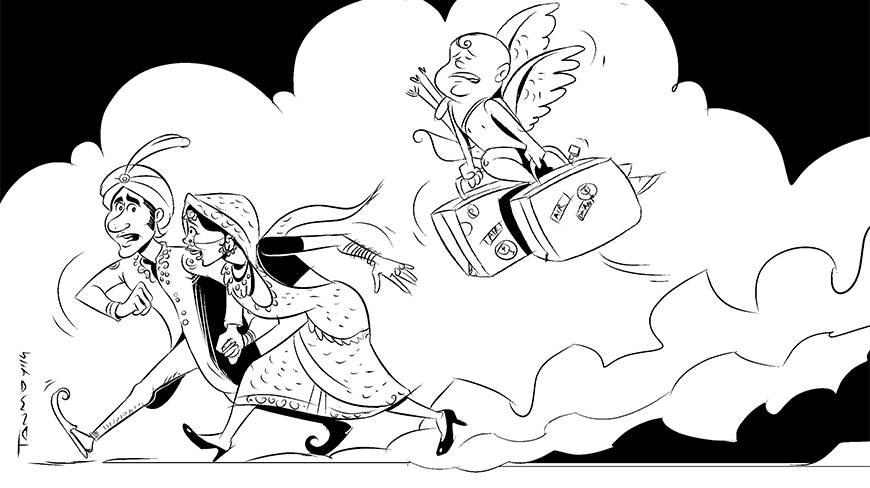You either hate or love that title! Agreed, it’s a bit of a stunt on my side to attract attention. Sorry, in this age of publicity, one sometimes needs to resort to gimmicks. However, the tale of love and elopement that comes now is definitely not an author’s trick to entice readers.
Lovers have eloped in the past and they still do so now, though the whole format has seen, what one may call, transformations due to the touch of technology in our lives.
An elopement twenty years ago was the ultimate sign of rebellion against social norms. “Paliye giye biye” may sound thrilling but in orthodox society, it had little or no acceptance. The couple had to endure snide remarks from elders though, while among the young, their action was deemed audacious.
French philosopher Voltaire may have said marriage is the only adventure open to the cowardly, but in the Bangladeshi context, where everyone is taught from early childhood that any form of “adventure” that went against tradition was totally unacceptable, running away became the sole method of taking a stand against society.
A few months ago, a report on an eloping couple created a furore because it had all the trappings of a melodramatic Bengali movie. One Sabina fled with her lover Ronny (names changed) and ended up in Shibganj. Both were university students and therefore of marriageable ages.
Er … wait a bit, there is a small issue here – the social status of the boy in question.
Son of a security guard of the same university, Ronny had committed the ultimate sin – running away with the daughter of an affluent businessman. Reminds one of the never-dying line from the Bengali movie in which the snooty rich girl finally falls in love with the driver.
What? How can you love a chauffeur when you are the daughter of the famed Chowdhury family? Yes, we have heard that line countless times.
As a matter of fact, love breaking class barriers is always a hit – look at Downton Abbey, where one of the girls from the aristocratic family decided to marry an impoverished man employed as a driver.
In movies, the Chowdhury girl escapes a life of opulence to lead a life of struggle, gives birth to a child, and eventually, the class-obsessed father realises that his daughter had married a true gem. “Gobore poddoful” (lotuses blossom in mud), and then there is bliss.
Of course we never know, if the husband, who had upheld his firm ideals in the face of wealth, finally decides: “My dear Abbahuzur, since we are all one happy family now, how about a BMW SUV?”
In real life, it didn’t work out that way for Sabina and Ronny. They seldom do. After the girl disappeared, a countrywide police alert was sent out.
When the couple was found, the industrialist father flew in on a helicopter to “rescue” his daughter. Reportedly, the girl had taken jewellery from home, but a legal case was to be framed against the boy for instigating the whole shameful act.
Nope, movies are very different from real life. Elopement can only work when the matter of social status of both sides is not a contentious one. But then, in such cases, why run away unless the girl and the boy decide to have some fun? Or are children from a Capulet-Montague scenario from Romeo and Juliet?
In the case of Sabina and Ronny, it’s clear that eventually it’s the family of Ronny that will have to feel the pressure for this errant episode. I am curious to know if Ronny’s father still has his job as a security guard or has been expelled for his son’s desperate heart.
In real life, the parents, as well as the son or daughter, from the economically-depressed side face the music. Surprisingly, the opposite is being regularly portrayed in all mediums of entertainment with happy endings almost 90% of the time.
They do say, movies, dramas, and literature are supposed to be a reflection of a zeitgeist. Sorry, but a hundred years from now that “filmi union” will only be the representation of an illusion.
The nagging question – while most in society are alert about status issues in cases of marriage and romance, why is it that in movies, rich and poor both revel in tales of fantasy?
This is my explanation – firstly, playing the roles of the boy and the girl in a movie are top film actors, and so even if their cinematic status is low, subconsciously, our instincts are influenced by the glamour quotient of that actor or actress.
Hence, when Shahrukh Khan, or Sakib Khan for that matter, plays the role of a street musician, we become besotted. Again, the character of a bar dancer portrayed by either Kareena or Bobby has the same impact. The film’s roles are supported by their real-life status as top earning actors.
The moral of the story is a bit cruel – allow Cupid to make some calculations first before taking the plunge, otherwise the dream prince or princess will be taken away in a helicopter, the fantasy will be shattered, and well, the condom will remain unused (as was found in Ronny’s pocket).
Source: Dhaka Tribune










